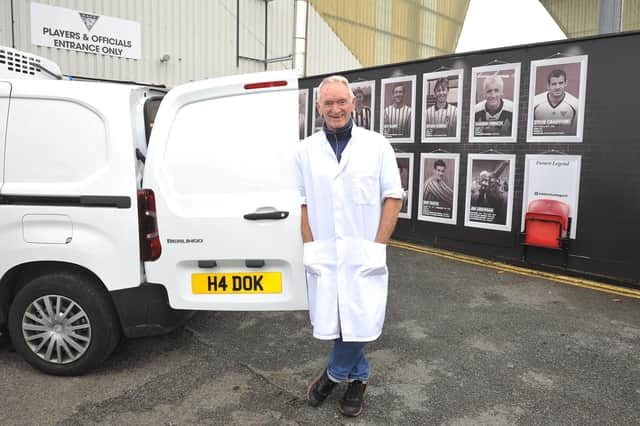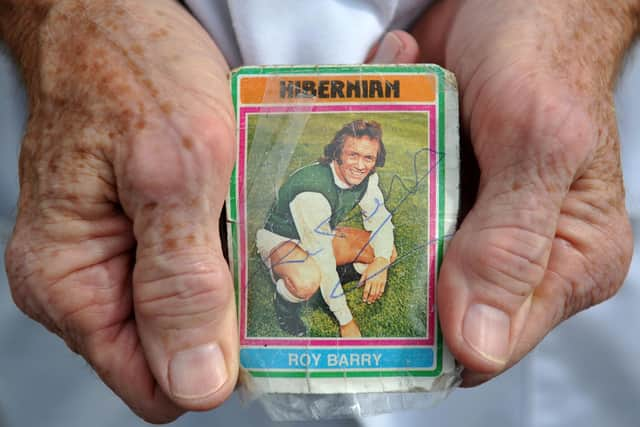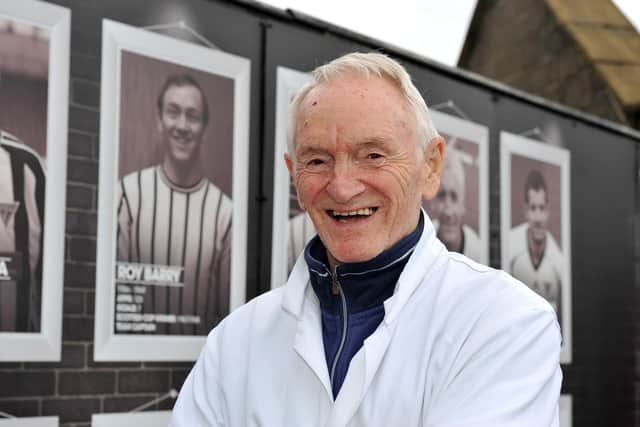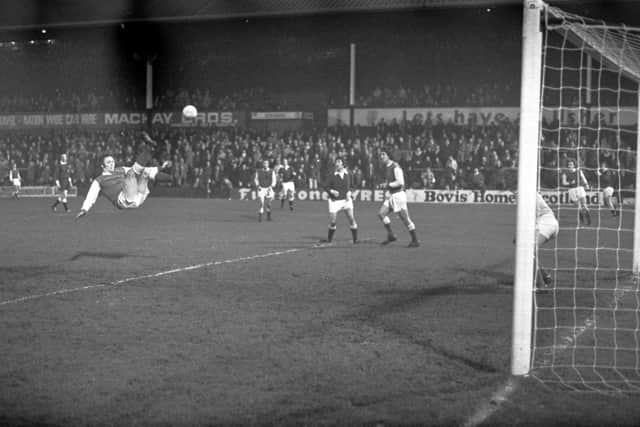Hearts v Hibs: Don't turn up late or leave early for an Edinburgh derby - from Roy Barry, a man that knows


In September, 1965 at Tynecastle, with Hearts fans still wondering how they managed to let the title slip from their grasp in the previous season’s finale, Jimmy O’Rourke scored for Hibernian in the third minute. By the tenth the Hibees were four-nil up. “Didn’t Jimmy score two that day?” Yes he did, Roy, Eric Stevenson also contributing a double. “The wee man was a good friend of mine and didn’t ever let me forget that game. It was a nightmare. Our heads were completely scrambled. Some Hearts supporters were still queueing at the turnstiles. They were the lucky ones. The smart ones turned round and went straight home. Me, I spent the rest of the match trying to get myself sent off so I could go home, too. Sadly [referee] Bobby Davidson wouldn’t oblige.”
Ten years later after a spell in England Barry was a Hibee for another Tynie clash with just as astonishing a climax and one that’s been revived on social media in the countdown to the clubs doing battle tomorrow for the first time in this campaign.
Advertisement
Hide AdAdvertisement
Hide Ad“Hearts were winning 1-0 [Ralph Callachan, another who would cross the city divide, scoring] and my new team couldn’t find a way back. Then in injury time John Brownlie – a world-class full-back – fired over another cross. Pat Stanton threw his head at it and – wow – the ball hit the net. How late was that goal! It was a time when the pubs shut in the afternoons. The goal was so late it came after they’d reopened at five o’clock. Some Hearts fans were supping their pints, toasting what they thought was a victory, until the rest piled in with the news.”


Barry has good recall of the clatter and clang of his favourite contest but he’s surprised that his derby debut was so far back in the mists – and, a Gorgie feature, brewery fug – of time. Fifty-nine years ago today, Roy – September 8, 1962. “No, it can’t be! Did we win?” Hearts 4, Hibs 0. John Cumming opened the scoring, then Danny Paton banged three past Robbie Simpson. “That’s all right then. The indestructible John. And Danny had a bodyswerve that was unique.”
I catch up with him on his rounds delivering fish across Fife. Now 78, he knows he’s fortunate to have the old memory-box intact, considering he was a centre-half whose job was to head a heavy, scudding ball. “Some poor souls – friends of mine – are suffering but I’ve been lucky,” he says. “I think it’s important to use what’s inside your head and for some of us that’s not a lot. I’ve always tried to keep my mind active and I’m sure that’s helped me. Take what I’m doing now. I was in the private hire business in London after I quit football and got to know the Big Smoke like the back of my hand. But Fife’s a challenge; you can get awfie lost here. At first I’d end up in Kinghorn when I should have been in Dalgety Bay. I work for my brother-in-law Douglas Murray, the fishmonger in Inverkeithing. His regular driver didn’t turn up one day and he asked me to help out, just for a fortnight. That was seven years ago and I’m still doing it and still needing to keep my wits about me.”
Barry had a high old time across two decades in the game. As captain of Dunfermline Athletic, amid stirring European adventures, he drank victoriously from the Scottish Cup. As stand-in boss of Oxford United he was required to watch chairman Robert Maxwell, too lazy to waddle to the loo, relieve himself in flower pots.
He starred for Coventry City and Crystal Palace when both clubs threatened to be the future of English football, the latter under the flamboyant leadership of Malcolm Allison whose idea of generating publicity would be to invite top-shelf mag pin-up Fiona Richmond to join the players in the communal bath.


But you don’t want to hear about that, do you? You want to know what it was like to play in the Edinburgh derby, 59 years ago. We tend to think that football back then was less frenetic, the demeanour of the fans less damning. “Well,” Barry says, “I was desperate to win the derby when I played for Hearts and when I came to Hibs, because they were my team as a boy and I was nearing the end of my time, probably even more desperate. Don’t think our era was ‘After you, old chum’ – we hated each other! On the pitch, that is. Off it, we got on well. I was good friends with Peter Cormack and Neil Martin and Gerry Baker would be among the Hibs guys we’d meet for a drink, although we had to keep those sessions quiet.”
Barry grew up in a tenement in Edinburgh’s Jamaica Street, long since gone. When your correspondent lived in nearby Great King Street, the wrecking-ball demolishing those condemned properties provided much childhood excitement. “To begin with we were on the top floor, five families sharing the one bathroom. Then we got posh, moved to the ground floor where we had our own loo. It was such a novelty that I used to pull the chain all the time, just to hear it gurgle. Then we got really posh and moved to your Great King Street. My mother got a job as caretaker for a doctor, which came with the basement flat beneath the surgery. Little did we know this fellow was the Hibs doctor. I was playing keepy-uppy one day when [Famous Five goalkeeper] Tommy Younger looked over the railings and said hello. I was so excited I could hardly breathe.”
At Easter Road another Tommy – Lawton of Arsenal – was young Barry’s quest when the Gunners came to town for a friendly. “I ran on the pitch as Tommy was about to kick off to get his autograph and just managed to leap back over the terracing wall before a bobby could catch me. The crowd all cheered.” In 1961 he hung off the floodlight pylons to see his favourites topple Barcelona but a year later was kitted out in maroon, a junior Jam Tart.
Advertisement
Hide AdAdvertisement
Hide AdHe says: “I didn’t want to become a footballer because my heart was set on the forces. I just missed National Service, which I would have loved, but after working as an apprentice welder at the Henry Robb shipyard in Leith, decided I would join the Royal Navy. I told this to the scout who spotted me playing on Leith Links. My father gave me a thump on the back of the head: ‘You’ll dae what you’re telt – you’re signing for the Hearts.’ Dad was a fanatic, you see.”


The Gorgie line-up in that first derby was: Gordon Marshall, Willie Polland, Davie Holt, Cumming, our man, Billy Higgins, Willie Wallace, Paton, Norrie Davidson, Willie Hamilton, Johnny Hamilton. Mention of the two Hammys makes Barry smile. “Willie was a genius but a terrible man for the drink. He hated training and when we were running in the Pentlands I used to tie a rope round his middle and haul him up the hills.
“But on the pitch he could bend a ball. Hit it 30 yards and get it to swerve round an opponent. Everyone can do that now but Willie was the first. Like Alex Edwards when I went to Dunfermline, he was a player I regarded as being ahead of his time. Willie was an artist and Johnny was a character. He had a full set of false teeth which he took out to play. Johnny liked to argue with refs but with his wobbly lips it must have been difficult for him to get his point across.”
While there was artistry and unintentional comedy in Barry’s day, blood and thunder tended to be the derby’s central theme. “Guys like John Cumming and Bobby Kirk, Bobby Parker and Dave Mackay – they were assassins.
And this might surprise fans now, but when football was truly working-class Hibs versus Hearts for the fans was a fight between the shipyards and the coal mines. There were obviously exceptions but Hibs supporters tended to be from the docks while the Hearts boys worked down the pits. Who were going to be top dogs?”
Barry may not have made it into the military but by way of compensation, he was happy to fall under the command of Tynecastle trainer and ex-regimental sgt major Johnny Harvey who became a formative influence. “I liked discipline and Johnny was big on it. He set standards for young men. Socks always dead level, shirts always tucked into shorts. He checked our feet – ‘Always keep your toenails neat and tidy’ – and our hands. I had no problem with any of this – at Boys’ Brigade camp I used to relish the inspections – although I drive my good lady Jane mad because I’m a pain in the arse around the house and she’s convinced I’ve got OCD. You should see our fridge: everything neatly sorted. It’s like a display cabinet you’d show off to the neighbours. Apparently David Beckham arranges his so all the labels are showing. I think he’s been snooping around our place.”
Barry’s manager at Hearts, from first to last, was Tommy Walker. “He was, or gave the impression, that he was a cut above us rough-and-ready guys. I liked him, he was a gentleman, but I wanted him to fire us up in the dressing-room whereas sometimes he would lead us in prayers.” In his first season Barry had to wait five months for the New Year derby on account of the “frostquake” winter of 1962/63 which paralysed sport and much else besides. That was an exciting 3-3 draw and next time out there was another six-goal thriller, Hearts winning 4-2. And they were leading through Willie Wallace in his first Ne’er Day encounter ushering in ’64 but then Barry gave away a penalty. “It never was,” he rasps.
Back then the league only provided derby devotees with two per season but each May for three successive campaigns there were two more as the rivals battled for the Summer Cup and the East of Scotland Shield. Cormack, Donald Ford, Pat Stanton and Colin Stein were blooded as teenagers in these games and Barry remembers there being no diminution in the derby’s intensity.
Advertisement
Hide AdAdvertisement
Hide AdHibs won a few of them and they would also triumph in the last in the league featuring Barry in maroon when, probably inspired by the 1966 World Cup, he took a sweeper’s role behind George Miller and Alan Anderson, the Leith team winning 3-1 with goals from Joe Davis, Allan McGraw and Jim Scott.
Barry didn’t want to leave Hearts but, in hindsight, it was a great move, leading to Hampden glory with the Pars and with Coventry jousts with three of the greatest: Sir Stanley Matthews, George Best and Pele. He says: “I’ll always be grateful to Hearts for giving me the opportunity to become a footballer, but compared to the fun I had at Dunfermline, Tynecastle could be a stuffy place. Also, something which niggled me was the club regarding themselves as posh compared to Hibs who were ragamuffins. When I came back later for dinners the atmosphere was quite masonic. A guy at the top table would announce: ‘We are Heart of Midlothian … ’” There’s nothing wrong with promoting your team but this was like a superiority complex. I was there to see old pals like Donald [Ford] and Willie [Polland] but eventually had to stop going to them.”
At Palace Barry had been impressed by Malcolm Allison’s coaching techniques but these would be trumped by Eddie Turnbull. “Getting to Easter Road for a wee Hibby like me was utopia and first day there Eddie had me mesmerised. His methods were revolutionary. He was the best coach I ever had. But what a dour, dour man he could be!” Barry was part of the rebuild, post-Turnbull’s Tornadoes, but thrilled that half that swashbuckling side were still at Easter Road. He lasted a season and a half before a game against Motherwell when an old Coventry team-mate, Bobby Graham, gave him the runaround. “I couldn’t get near him, wanted to put the head on him. At halftime Eddie said: ‘You’re not going back out.’ Young Derek Spalding was bouncing around, ready to take my place. And that was it for me.”
And that’s it for me; Barry must get back to his fish rounds. But before he goes he opens his wallet and produces an old cigarette card of himself in emerald green. “Here’s the proof – I played for the Hibs,” he says, “and didn’t I not lose a derby with them?” That late, late draw and three wins – dead right, Roy.
A message from the Editor:
Get a year of unlimited access to all of The Scotsman's sport coverage without the need for a full subscription. Expert analysis of the biggest games, exclusive interviews, live blogs, transfer news and 70 per cent fewer ads on Scotsman.com - all for less than £1 a week. Subscribe to us today
Comments
Want to join the conversation? Please or to comment on this article.
